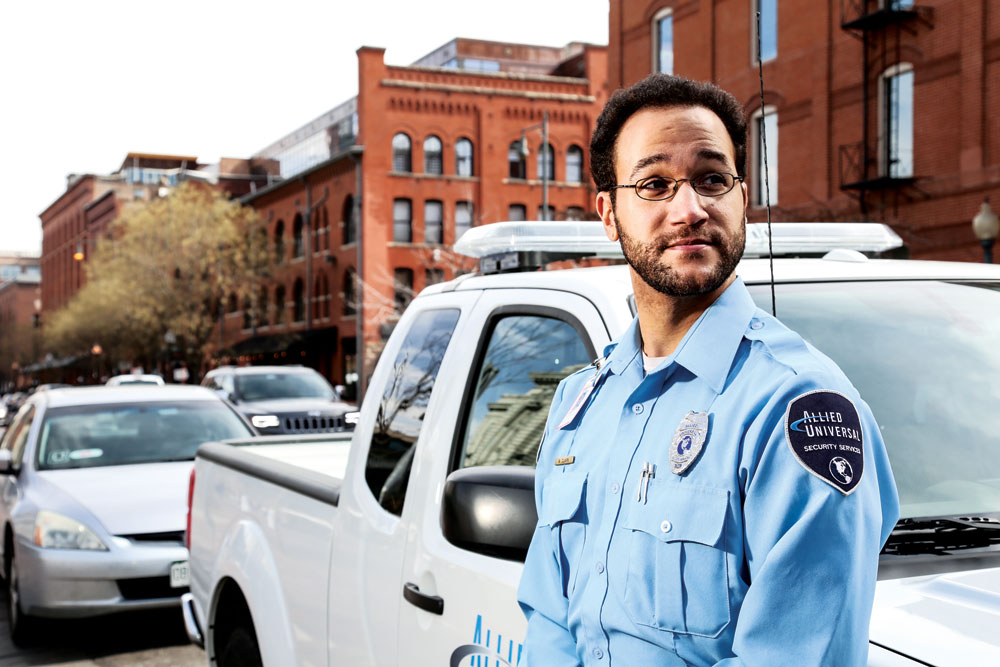
Security professional Matthew Clark patrols the LoDo section of Downtown Denver. His employer Allied Universal Security works closely with law enforcement.
Despite a relatively low—and declining—crime rate, some Stapleton residents are concerned about petty theft. Porch piracy. Thefts from vehicles. Stolen bikes. “First-world problems” to some, the ongoing incidence of these nonviolent crimes troubles others, who feel that installing cameras, locking doors, and being vigilant isn’t effective enough.
Hiring security patrols to monitor and report crime has been suggested by some residents, perhaps by having the Stapleton Master Community Association (MCA) collect an additional fee. Or it could be paid for through crowd-funding, possibly even in select neighborhoods.
But while these folks are focused on the benefits of security patrols in addition to the District 5 police, others stand in stark opposition. Private security would give Stapleton the appearance of an elite gated community, something these residents did not want or expect when they chose the neighborhood.

Rebecca Roberts Berman and Amy Calabrese attended the NE Denver Neighbors for Racial Justice meeting where they discussed microagressions in August 2016;
Responding to community concerns and Lt. Ian Culverhouse’s acknowledgement of the potential benefits of private security, the MCA obtained an estimate of $12/month to fund patrols, if implemented through MCA dues. Other communities have used crowd-funding and monthly subscriptions for unarmed security patrols (see sidebar).
Stapleton United Neighbors (SUN) currently has a survey asking residents about their willingness to pay $15/month for round-the-clock private patrols (and their views on numerous other subjects). The survey results would be the basis for any recommendation SUN might make to the MCA board. Any increase in assessments would need to be supported by a majority of elected MCA Community Delegates and the MCA Board of Directors.
Neighborhood Perspectives
Questions about hiring private security concern the necessity, feasibility, and cost. But beyond practical matters remains the concern that Stapleton “would start to feel like a gated community,” said Paul Nath, a Westerly Creek resident. In a community based on a vision of diversity and inclusiveness, a number of residents believe the appropriate approach to safety and security is through vigilance and prevention.
Troy Bishop, a Conservatory Green resident since 2013, thinks security patrols are a “misguided idea.” “The majority of the crimes in Stapleton are crimes of opportunity, not violent crimes,” he noted. If residents take simple measures, like locking doors and closing garages, Bishop believes the problem will be better prevented than it would be by hiring security. He also wouldn’t want to pay additional MCA dues or lose existing MCA services to hire patrols, though he did express interest in learning what it would cost.
But with forced entry incidents being shared in social media and package thefts and other petty crime occurring repeatedly, some residents are now feeling like Stapleton has become a target. District 5 police caught a woman who was staying at the Staybridge Suites, apparently for the sole purpose of stealing packages from porches in the surrounding neighborhood. These incidents have led some residents to believe private security patrols could act as an extension of the eyes and ears of the neighborhood, a means of outsourcing neighborhood watch activities. At the least, they believe it should be investigated.
Ben Lipman, who has lived in Stapleton since 2005 and currently resides in Conservatory Green, believes patrols would probably serve as a deterrent, and a supplement to existing police services. “I don’t expect police to stop package theft,” he said. “Not to downplay it, but there are just much more important things for them to be doing.” As a child psychiatrist, he is less concerned about small items being poached than potential confrontations between children and thieves. More than anything, Lipman feels it is worth having a reasoned, community discussion, not merely heated exchanges on social media. “It would be nice to know some of the data, some of the cost, some of the statistics, and it might be worth trying.”

Liz Hogan Stalnaker
Northeast Denver Neighbors for Racial Justice
Among those opposed to the idea of security patrols are members of Northeast Denver Neighbors for Racial Justice, an alliance of local people who are concerned about issues of race, diversity and social justice, with 331 people listed in their Facebook group. In an impassioned conversation on Facebook, some members of the group discussed their opposition to private patrols.
A big concern is that racial profiling will disproportionately target people of color in the community. Erin Parkins articulated numerous other reasons for the group’s opposition, including that private security perpetuates socioeconomic inequality where only those who can afford it deserve to be safe, fosters an image of Stapleton as being exclusive, will not be cost-effective, is not affordable, is unlikely to be effective, and funds could be better spent on crime prevention or in other neighborhoods that are truly at risk.
Police Perspective
Lt. Culverhouse of District 5, which covers the Stapleton area, says he’s officially neutral but he can see the potential benefit of additional “eyes and ears”—though it is unclear if it could reduce crime or by how much. He doesn’t believe private security would be a hindrance, but he also believes, “we are appropriately and adequately policing and keeping the community safe. [Security patrols are] just one extra layer, like getting an alarm system.” District 5 has recently added six new recruit officers and is one of only two districts in DPD to have shown a decrease in overall crime in 2016.
District 5 police frequently repeat the prevention mantra, reminding residents that many of the neighborhood’s crimes are preventable—and Culverhouse promotes other security measures. A properly placed, high-resolution security camera—that is, one that catches a good frontal view of a suspect—can help deter criminals, as can adequate lighting, which also helps emergency services find addresses. And, of course, neighborhood watches: “It really does help when neighbors are watching out for each other,” says Culverhouse.
Feasibility
Security companies interviewed for this article offered differing perspectives.

Juanita Metoyer
Stapleton resident Galen Morrow owns Advanced Professional Security, located in the Northeast Park Hill area. He believes Stapleton presents an “immense challenge” due to its vast area, which might require multiple patrol cars depending on the desired frequency. Typically, he says, security patrols take place in more confined areas, or for businesses with set hours. Furthermore, residential patrol requires specialized training to ensure there is no harassment, undue use of force, or unnecessary notification of the police. With sufficient community support—including financial—Morrow thinks it could be done, but other measures might be more effective, like strategically placed, hi-resolution cameras that could be centrally monitored via the internet (“IP Cameras”)—either by volunteer residents or professional security personnel.
In contrast, Andy Coleman, vice-president for the southwest region of Allied Universal Security, says his company regularly provides large-scale security patrols for residential communities the size of Stapleton, and many of the communities are indeed gated. Allied Universal, which currently provides ancillary security for the 16th Street Mall in Denver, works closely with local law enforcement officials, who are often too strapped to handle the types of petty crime that can plague residential neighborhoods.
None of Allied Universal’s security patrols are armed and Coleman says racial profiling “doesn’t come into play—our patrols are just observing, not interceding.” Their guards are trained to approach and interact in ways designed to gain information. For example, a person that appears to be casing a neighborhood might be asked by the security officer if they need help or directions —an approach that has the effect of deterrence without conflict.
With miles of alleys, multiple entrance points, and a geographic distribution that spans seven square miles across a freeway, the feasibility and cost of the private security in Stapleton may prove daunting. Should simple preventative measures like those taken in most urban communities—locking doors, turning on lights, closing garages—be the default neighborhood policy? Would “outsourcing a neighborhood watch program” help deter people from taking advantage of the opportunities that Stapleton seems to be presenting? Or would it put Stapleton on a path toward elitism and exclusion, widening the divide among neighbors and neighborhoods?
________________________
The Case of Lower Rockridge
Lower Rockridge, a neighborhood in Oakland, Calif., that is smaller in size and population than Stapleton, has experimented with hiring private security patrols for public streets. Many Bay Area professionals are drawn to Rockridge, a neighborhood both more diverse and more affluent than Stapleton.
In 2013, the crime concerns of Rockridge weren’t a priority for the Oakland P.D., which was stretched thin dealing with gang activity and homicides in other parts of the city. After a mugging occurred in the neighborhood, on top of a 24 percent increase in robberies, residents in Lower Rockridge pulled together a crowdfunding campaign to provide security patrols for their neighborhood.
The concept was not without its critics, many of whom feared racial profiling or overzealous vigilante justice, recalls Dakin Ferris, a Rockridge resident and attorney.
Rockridge’s patrol officers are unarmed, friendly, and instructed not to intervene. “They are there to take pictures, to monitor the situation and call the police,” said Ferris. “We look at the patrols as an outsourced version of neighborhood watch programs,” said Ferris. They knock on doors if they find garages or car trunks left open. And since security patrols do not detain anyone or directly intervene, race-based targeting has not been a problem.
Google economist and Rockridge resident Paul Liu, through mathematical modeling, found that robberies and burglaries in the patrol area decreased a statistically significant 30 percent over the first year of patrols. After three years, the patrols continue to be supported via voluntary monthly subscriptions supplemented with corporate sponsorships. A recent survey in the area reported 94 percent satisfaction with the patrols. Seventy-five percent of respondents felt safer with the patrols and 87 percent wanted the patrols to continue for another year. Most subscribers contribute $30 monthly.
The patrols cover the entire neighborhood, however, not just the homes of those who subscribe. Subscribers get additional benefits, such as security escorts from the train station at night and additional security passes when on vacation, said Ferris.
Also see article: “Nabbed, Serial Burglar Caught.”

0 Comments